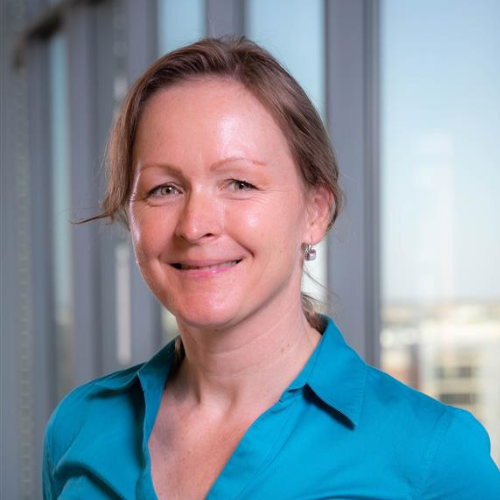Nurse Practitioner Expands Lactation Services in Underserved Aurora Neighborhoods
CU Medicine’s Sylvia Sevcikova, FNP, brings specialized support to new and expecting families at Aurora Wellness Community Health Center.
At the heart of the Aurora Wellness Community Health Center, Sylvia Sevcikova, FNP, is pioneering a compassionate and inclusive approach to maternal health through new lactation support services designed specifically for the ethnically diverse Aurora communities that need them most.
“I really love the holistic approach that our physician and nurse practitioners can provide,” Sevcikova said. “It’s rewarding work to help families thrive and heal together. I’ve always valued the family-centered model, where I can not only care for both mom and baby, but also engage fathers and other family members.
.png?sfvrsn=3aaa0963_1)
With more than a decade of lactation consulting experience in a variety of clinical, academic and public health roles in Colorado Springs and internationally at a military base in Germany, Sevcikova career has been shaped by a deep commitment to improving maternal and infant outcomes. She is nationally board certified and has trained medical staff to support the Baby Friendly Hospital Initiative, presented at several international breastfeeding conferences on epigenetics and human breastmilk, and has a passion for teaching. She continues to advocate for vulnerable populations and is excited to have very supportive leadership that leads efforts to build a welcoming, inclusive support environment for new families at the center. “Dr. Kelet Robinson, MD, our medical director, Dr. Jennifer Hronkin, MD, family medicine community practice group medical director, as well as our clinic’s entire team are all very supportive of this breastfeeding initiative, which makes it even more exciting!
Creating health equity through lactation care
Located in Aurora at 1300 S. Potomac St., the Aurora Wellness Community Health Center was founded to meet the health care needs of the city’s most underserved areas — particularly in ZIP codes 80010, 80011 and 80012. These communities experience higher rates of mortality and morbidity, especially among Black women.
“Many of our patient’s present with unique challenges that increases their vulnerability to chronic disease and mental health stress,” Sevcikova said. “By bringing my lactation and maternal health experience to the family medicine clinic here, I feel very fortunate to be able to do what I love in a place that really needs it.”
Her work ties into Healthy People 2030, a federal initiative aimed at improving health and reducing disparities nationwide. Breastfeeding, she explained, is both protective and empowering.
“It can be considered the baby’s first immunization, or personalized medicine, that significantly decreases an infant’s risk of developing serious illnesses and diseases,” she said. “The World Health Organization calls breastfeeding one of the most powerful and cost-effective tools we have to improve infant survival globally.”
A systematic review and meta-analysis showed that that delaying breastfeeding just by one day or more resulted in more than double the risk of neonatal mortality compared to those who started breastfeeding within the first hour.
“Breast milk is often referred to as golden liquid, and in the lactation world we really protect every drop,” shares Sevcikova. It is a living, biologically dynamic medium that adapts to a baby’s changing needs throughout infancy, shifting its composition based on the baby’s growth and individual needs.
Breast milk boosts a baby’s immunity, provides optimal nutrition, protects the mother’s health, fosters attachment, bonding and decreases the family’s cost for formula. It also offers health benefits for the mother, including a decreased risk of breast, ovarian or endometrial cancers, cardiovascular disease, and improved glucose control for mothers with diabetes. For example, breastfeeding reduces the risk of developing breast cancer by 4.3% for every 12 months a woman breastfeeds. It also helps with postpartum weight loss.
Still, Sevcikova knows each family’s journey is unique and respects their choices.
“All parents are welcome at our clinic — including mothers recovering from addiction, same-sex or chest feeding parents, and parents who choose to combine breastfeeding and bottle-feeding or exclusively bottle-feed for unique reasons, such as professional demands,” she said. “Not every parent can or chooses to breastfeed, and I want all parents to feel safe, heard, seen and supported at our clinic.”
Services that meet families where they are
The lactation and maternal health offerings at the center are integrated directly into primary care and delivered both in person and via telehealth. Services include:
- Preconception counseling for couples.
- Lactation support, including assistance with latch, pain during breastfeeding and addressing a variety of infant feeding and growth difficulties. She also provides support for parents with multiples, preterm infants and breastfeeding parents with unique medical conditions that may impact breastmilk supply.
- Maternal mental health care, including screening and support for postpartum mood disorders while breastfeeding.
- Parental lactation education and support through virtual visits.
By addressing the full spectrum of care, the team at the Aurora Wellness Community Health Center are looking forward to creating long term change in Aurora’s maternal-child health landscape.

“We’re building an integrated system that uplifts entire families, and we are very excited to have the opportunity to serve our culturally-diverse community.” she said.
To learn more or schedule a visit, call (720) 835-1125 or visit the Aurora Wellness Community Health Center page.
Learn more about Sylvia Sevcikova, FNP by visiting her CU Medicine provider page.

